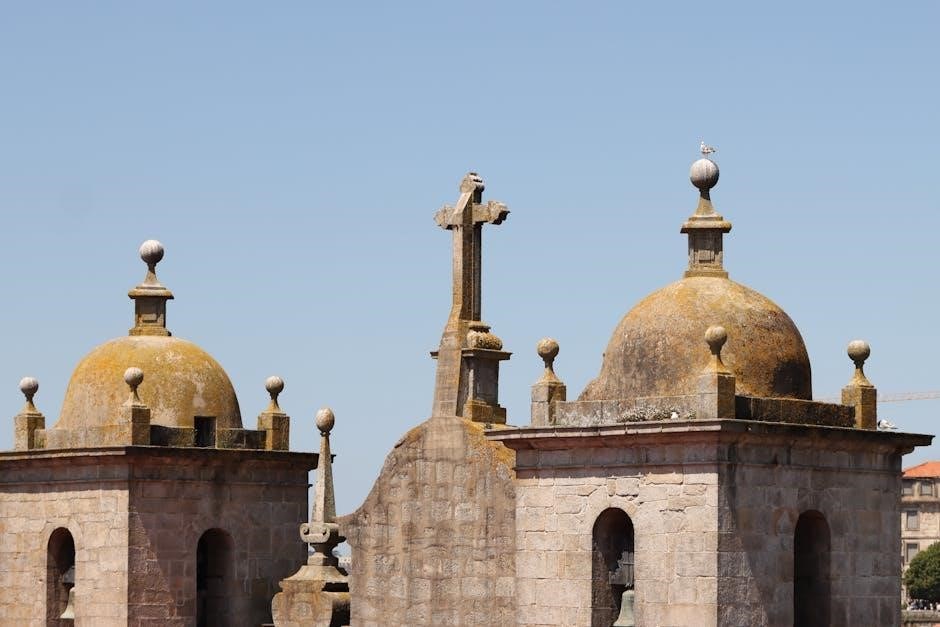The 2024 Catholic Voters Guide is a vital resource for faithful Catholics, offering insights into aligning votes with Church teachings, conscience formation, and key moral issues shaping the election․

Key Principles of Catholic Voting
Catholic voting is guided by the formation of conscience, the common good, and subsidiarity, ensuring decisions reflect moral teachings and promote human dignity, justice, and the well-being of all society․
The Formation of Conscience
The formation of conscience is a cornerstone of Catholic voting, emphasizing the moral obligation to inform decisions with Church teachings and prayerful reflection․ Catholics are called to shape their consciences through Scripture, the Catechism, and papal encyclicals, ensuring alignment with divine truth․ This process involves discerning issues like life, family, and social justice, and evaluating candidates based on their adherence to moral principles․ The Church encourages voters to move beyond party loyalty, instead prioritizing ethical considerations and the common good․ By forming their consciences, Catholics fulfill their duty to contribute to a just society, guided by faith and reason․ This spiritual discernment empowers voters to make choices that uphold human dignity and promote the Gospel’s values in the 2024 election and beyond․
The Common Good
The common good is a central principle in Catholic social teaching, emphasizing the promotion of the well-being of all people, especially the vulnerable․ Catholics are called to prioritize policies and candidates that foster a society where every individual can thrive, particularly the poor, the unborn, and marginalized communities․ This principle aligns with the Church’s commitment to human dignity and solidarity․ In the 2024 election, voters are encouraged to evaluate candidates based on their commitment to issues like social justice, healthcare access, and immigration reform․ Pope Francis has underscored the importance of addressing systemic inequalities, urging Catholics to advocate for policies that reflect compassion and justice․ By supporting the common good, Catholic voters contribute to building a society rooted in love, respect, and the Gospel values of mercy and care for all․
The Principle of Subsidiarity
The principle of subsidiarity, rooted in Catholic social teaching, emphasizes that decisions should be made at the lowest level of authority closest to those affected․ This ensures that local communities retain control over matters impacting their lives, fostering a more equitable and responsive society․ In the context of voting, Catholics are encouraged to support policies that empower individuals, families, and local institutions rather than overly centralized systems․ Subsidiarity promotes a balance between individual responsibility and collective action, ensuring that higher authorities intervene only when necessary․ This principle aligns with the Church’s call for a more just and personalized approach to governance, where the dignity of all people is upheld․ By applying subsidiarity, Catholic voters can help create a society that values human flourishing at every level․
The Role of Catholic Voters in 2024
Catholic voters in 2024 play a pivotal role in shaping the political landscape, leveraging their collective influence to advocate for policies aligned with Church teachings and the common good․
The Impact of Catholic Voters
Catholic voters hold significant influence in the 2024 election, particularly in swing states, where their collective voice can tip the balance․ As a major religious bloc, they bring moral and ethical considerations to the polls, shaping outcomes on issues like life, family, and social justice․ Their engagement reflects a commitment to faith-informed decision-making, guided by Church teachings․ With the election expected to be close, Catholic voters’ choices could prove decisive, emphasizing the importance of conscience formation and alignment with Catholic values․ Their impact extends beyond politics, inspiring a broader cultural shift toward justice and compassion, making them a pivotal force in 2024․
Catholic Voters in Swing States
Catholic voters in swing states play a pivotal role in the 2024 election, as their influence can significantly alter the electoral landscape․ States like Florida, Pennsylvania, and Wisconsin, with substantial Catholic populations, are critical battlegrounds․ These voters often hold the balance of power, making their faith-informed decisions crucial․ Issues such as life, family, and social justice resonate deeply, guiding their choices․ The concentration of Catholic voters in these states means candidates must address their concerns to secure victory․ This dynamic underscores the importance of Catholic voter engagement and education, ensuring their voices are heard and values upheld․ Their impact is not just political but also a testament to the integration of faith and civic responsibility․

How to Evaluate Candidates
Evaluating candidates involves aligning their policies with Catholic teachings, assessing their moral integrity, and considering their commitment to the common good and dignity of all life․
Aligning with Catholic Teachings
Aligning with Catholic teachings is central to evaluating candidates․ Catholics are called to vote in accordance with the moral principles outlined by the Church, such as respect for life, family, and social justice․ Key doctrines include the sanctity of life from conception to natural death, the importance of traditional marriage, and care for the poor․ Voters should consider candidates’ stances on abortion, euthanasia, religious liberty, and immigration; The Catechism of the Catholic Church and statements from the U․S․ Conference of Catholic Bishops provide guidance․ Catholics are urged to prioritize issues that involve intrinsic evils, such as abortion, over negotiable policy differences․ By prayerfully discerning and forming their consciences, Catholic voters can support candidates whose policies align with the Gospel and promote the common good․
Assessing Policy Positions
Assessing policy positions is crucial for Catholic voters to ensure alignment with Church teachings․ Key areas to evaluate include respect for life, family values, social justice, and religious freedom․ Voters should compare candidates’ platforms with Catholic doctrine, focusing on issues like abortion, euthanasia, immigration, and economic policies․ The U․S․ Conference of Catholic Bishops provides guidance through documents like “Forming Consciences for Faithful Citizenship․” Catholics are encouraged to prioritize policies that uphold human dignity and the common good․ While no candidate may fully align with Catholic teachings, voters should weigh the moral implications of each policy․ Resources like the Register’s 2024 Voters Guide offer detailed comparisons, helping Catholics make informed decisions․ By prayerfully considering these issues, voters can support candidates whose policies best reflect Catholic values and promote a just society․
Evaluating Candidate Integrity
Evaluating candidate integrity is essential for Catholic voters, as it reflects the moral character and trustworthiness of those seeking office․ Catholics are called to support leaders who uphold truth, justice, and ethical governance․ A candidate’s integrity can be assessed by examining their consistency in word and action, adherence to moral principles, and commitment to the common good․ Past behavior, including honesty, transparency, and accountability, provides insights into their reliability․ Additionally, voters should consider whether candidates promote policies that align with Catholic teachings on life, dignity, and social justice․ While no candidate may perfectly embody these values, the goal is to discern who best represents integrity and moral leadership․ Prayerful reflection and reliance on Church teachings can guide Catholics in making informed decisions, helping to choose leaders whose character and actions align with the principles of faith․
Important Moral and Ethical Issues
Catholic voters must consider key moral issues like respect for life, family values, social justice, and religious liberty, aligning their choices with Church teachings and conscience․
Respect for Life
Respect for life is a cornerstone of Catholic teaching, emphasizing the sanctity of human life from conception to natural death․ Catholic voters are called to uphold this principle by supporting candidates who oppose abortion, euthanasia, and the death penalty․ The Church’s stance on these issues is clear: every human life has inherent dignity and must be protected․ In evaluating candidates, Catholics should prioritize those who defend the unborn, the elderly, and the vulnerable․ This aligns with the moral obligation to promote a culture of life and reject policies that undermine human dignity․ The 2024 election presents critical opportunities to advocate for life-affirming policies, making it essential for Catholic voters to prayerfully consider these issues and vote in accordance with their conscience and Church teachings․
- Opposing abortion and euthanasia
- Rejecting the death penalty
- Supporting a culture of life
Family and Marriage
The Catholic Church emphasizes the sanctity of family and marriage as fundamental pillars of society․ Catholic voters are encouraged to support candidates who uphold the traditional definition of marriage as a union between one man and one woman․ The Church teaches that the family, rooted in marriage, is the basic unit of society and must be protected from policies that undermine its stability․ Issues such as parental rights, family values, and opposition to policies that redefine marriage are central to this principle․ Catholics are also called to advocate for laws that strengthen families and promote a culture of love, respect, and fidelity․ By prioritizing these values, Catholic voters can help build a society that honors the divine plan for family life and supports the well-being of all its members․
- Supporting traditional marriage
- Protecting family values
- Advocating for parental rights
Social Justice and Care for the Poor
Catholic teaching emphasizes the moral obligation to uphold social justice and care for the poor․ Voters are called to support policies that address systemic poverty, ensure access to essential services, and promote the dignity of all individuals․ The Church advocates for a preferential option for the poor, urging Catholics to prioritize their well-being in political decisions․ Issues such as healthcare access, affordable housing, and fair wages are central to this principle․ Catholic voters should also consider how policies impact vulnerable populations, including immigrants, the unemployed, and those on the margins of society․ By advocating for justice and compassion, Catholics can help create a society that reflects the Gospel’s call to serve the least among us․
- Addressing systemic poverty
- Ensuring access to essential services
- Supporting policies that promote dignity and fairness
Religious Liberty
Religious liberty is a cornerstone of Catholic moral teaching, ensuring the freedom to practice faith without coercion․ Catholics are urged to support candidates who uphold this fundamental right․ The Church emphasizes the importance of protecting religious freedom in both public and private spheres․ This includes opposing policies that infringe upon the conscience rights of individuals and institutions․ Issues such as religious persecution, freedom of worship, and the autonomy of religious organizations are critical considerations․ Catholics should advocate for laws that safeguard these liberties, both domestically and internationally․ By defending religious freedom, voters contribute to a society where diversity of belief is respected and flourishes․
- Protecting conscience rights
- Opposing religious persecution
- Supporting freedom of worship

Catholic Voter Resources and Guides
Catholic voters can access resources like Catholic Voter Guides, Church documents, and prayer materials to inform their decisions․ These tools align candidates’ policies with Catholic teachings and values, ensuring faithful engagement in the 2024 election․
Catholic Voter Guides
Catholic Voter Guides are essential tools designed to help faithful Catholics make informed decisions at the polls․ These guides provide detailed analyses of candidates’ positions, comparing them to Catholic teachings and values․ They often include excerpts from the Catechism of the Catholic Church and statements from the U․S․ Bishops to guide voters on key moral issues․ For instance, the Register’s 2024 Voters Guide combines candidate policy positions with citations from Church documents, ensuring alignment with Catholic principles․ Such resources emphasize the importance of conscience formation and evaluating candidates based on their stance on life, family, social justice, and religious liberty․ By offering clear and faith-centered guidance, Catholic Voter Guides empower voters to uphold their values and contribute to the common good in the 2024 election; They also encourage prayerful reflection and community engagement to ensure informed and morally grounded decisions․
Church Documents and Teachings
Church documents and teachings provide the moral foundation for Catholic voters in the 2024 election․ The Catechism of the Catholic Church and statements from the U․S․ Bishops are pivotal, offering guidance on issues like respect for life, family, and social justice․ These documents emphasize the importance of conscience formation and the duty of Catholics to align their votes with the principles of their faith․ By referencing these teachings, voters can assess candidates’ policies and ensure their choices reflect Catholic values․ Such resources also highlight the role of the Church in advocating for the common good and the dignity of all individuals, encouraging Catholics to engage actively in shaping a morally sound society through their participation in the electoral process․ This approach fosters a faith-centered and informed voting practice, essential for the 2024 election․
Prayer and Reflection
Prayer and reflection are essential for Catholic voters as they prepare to make informed decisions in the 2024 election․ The Church encourages Catholics to seek divine guidance through prayer, ensuring their choices align with moral teachings․ Reflection on issues like respect for life, social justice, and family values helps voters discern candidates who uphold these principles․ The Vatican and local parishes often provide prayer resources, such as Mass readings and devotions, to aid in this process․ Catholics are also encouraged to pray for candidates and the nation, seeking wisdom and integrity in leadership․ By integrating prayer and reflection into their decision-making, voters can foster a deeper connection between their faith and civic responsibility, ensuring their votes contribute to the common good and the dignity of all people․

The 2024 Election Landscape
The 2024 election is poised to be a pivotal moment, with Catholic voters potentially swaying a tightly contested race amid a complex political climate and shifting societal values․
Political Climate
The 2024 election unfolds amid a deeply polarized political climate, with significant issues like abortion, immigration, and religious liberty taking center stage․ Catholic voters are seen as a crucial swing bloc, particularly in battleground states․ Recent polls indicate a tight race, with Vice President Kamala Harris leading former President Donald Trump among Catholic voters․ Pope Francis has urged Catholics to vote with a well-formed conscience, avoiding candidates who oppose fundamental moral teachings․ The election has also highlighted divisions within the Catholic Church itself, with some bishops emphasizing the primacy of life issues while others advocate for a broader social justice agenda․ As the campaign intensifies, Catholic voters are being called to discern how their faith informs their political choices, making this election a defining moment for the role of Catholicism in American politics․
Major Candidates
The 2024 presidential race features prominent candidates with distinct positions on issues critical to Catholic voters․ Former President Donald Trump, the Republican nominee, has emphasized border security and religious freedom, which resonate with some Catholics․ Vice President Kamala Harris, the Democratic nominee, has highlighted social justice and healthcare expansion, aligning with aspects of Catholic social teaching․ Both candidates face scrutiny over their stances on life issues, with Trump’s immigration policies and Harris’s support for abortion rights drawing criticism․ Other contenders, such as third-party candidates, are also vying for Catholic votes by addressing moral and ethical concerns․ The diverse field challenges Catholics to evaluate how each candidate’s platform aligns with Church doctrine and their own consciences, making this election a complex and deeply personal decision for many․
Key Issues
The 2024 election presents several critical issues for Catholic voters, including respect for life, family and marriage, social justice, and religious liberty․ Life issues, such as abortion and euthanasia, remain central, with candidates’ positions under heavy scrutiny․ Family and marriage are also pivotal, as Catholics are encouraged to support candidates who uphold traditional values and protect the sanctity of marriage․ Social justice, particularly care for the poor and marginalized, aligns with Catholic teachings on the common good․ Religious liberty is another cornerstone, with many Catholics prioritizing candidates who defend freedom of conscience and faith․ These issues guide Catholics in evaluating candidates and forming their consciences, ensuring their votes align with Church doctrine and moral principles․

Faith in Action: Advocacy and Engagement
Faithful Catholics are called to shape their communities through advocacy and engagement, guided by prayer, education, and a commitment to uphold moral principles in public life․
Catholic Advocacy
Catholic advocacy involves promoting the Church’s teachings in the public sphere, urging policymakers to align laws with moral principles․ Catholics are encouraged to advocate for issues like life, family, and social justice, guided by the Gospel․ Prayer and education are central to effective advocacy, helping individuals form consciences rooted in faith․ The Catholic community plays a vital role in shaping public policies that reflect Catholic values, such as protecting the unborn, supporting families, and caring for the poor․ By engaging in advocacy, Catholics contribute to a society that upholds human dignity and the common good․ This collective effort strengthens the Church’s mission and empowers believers to be witnesses of faith in action․ Through advocacy, Catholics can inspire meaningful change and ensure their voices are heard in the 2024 election and beyond․
Community Engagement
Community engagement is a cornerstone of Catholic involvement in the 2024 election, fostering unity and collective action․ Parishes and Catholic organizations often host voter registration drives, educational seminars, and prayer events to mobilize the faithful․ By participating in local initiatives, Catholics can influence their communities and promote values-aligned policies․ Grassroots efforts, such as door-to-door campaigns and advocacy for specific issues, empower individuals to make a tangible impact․ Collaboration with other faith groups strengthens these endeavors, demonstrating the power of interfaith cooperation․ Through active engagement, Catholics not only shape the political landscape but also embody the Church’s call to serve others and promote the common good․ This collective effort ensures that Catholic values are represented at every level of society, inspiring meaningful change in the 2024 election and beyond․
The 2024 Catholic Voters Guide serves as a pivotal tool for Catholics to navigate the complexities of the election season․ By grounding their decisions in the teachings of the Church, voters can align their choices with moral principles, ensuring their voices advocate for life, dignity, and justice․ The guide underscores the importance of conscience formation, the common good, and subsidiarity, equipping Catholics to evaluate candidates and policies critically․ As the election approaches, the Catholic community is called to embrace its role as a transformative force․ Through prayer, education, and active participation, Catholics can shape a future where Gospel values are central to public life․ The 2024 election presents a unique opportunity to witness faith in action, inspiring a society that reflects the compassion, integrity, and hope rooted in Catholic tradition․
